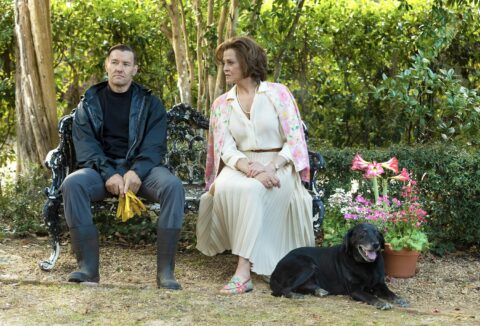“‘All that is very well,’ answered Candide, ‘but let us cultivate our garden.’”
– Candide, Voltaire, 1759
A late-period Paul Schrader movie (arguably even further refinements of the Taxi Driver [Martin Scorsese, 1976] formula) is certainly a known quantity. He is Robert Bresson’s most ardent American disciple — right down to the obsession with journal writing — and tells stripped-back, minimalist, un-flashy tales. So before watching Master Gardener (2022), the culmination of a thematic trilogy alongside First Reformed (2017) and The Card Counter (2021), I knew more or less what to expect.
What I didn’t expect here, was the odd tenderness imbued into every frame, using its main (at times rather tortured) gardening metaphor to explore the possibility of genuine personal growth while (mostly) putting darkness and violence to one side. While it certainly follows the formula of the last two films, Schrader’s fresh perspective makes it the most hopeful of the three. It’s like looking at the same sculpture from a different, more sympathetic angle.
Joel Edgerton plays the samurai-like, rule-bound, journal-writing, closed-off man this time. He is gardener Narvel Roth, head horticulturist at the gorgeous, colonial-esque estate Gracewood Gardens. While his previous life points to all kinds of chaos, the garden, with neatly arranged flowers in rows, and a team of dedicated employees, allows for him to be master of his domain. As Candide so eloquently points out, when you are gardening, the bigger questions of life are forgotten in the pursuit of achievable, smaller aims.
You know that it’s almost a matter of time before a young girl turns up and is placed under the Narvel’s wing. She is Maya (Quintessa Swindell), the great-niece of grand dowager Mrs. Haverhill (Sigourney Weaver). Orphaned, and mixed up in the wrong crowd, she’s given the chance for a do-over under Narvel’s tutelage. Almost immediately (and because this is a Schrader film), an element of racial prejudice comes through, both in Haverhill’s description of her as “mixed-blood” and the way she so easily disparages her Black father.
As for Narvel, he’s not so easy to read. Edgerton, in my favourite performance of his so far, comes alive when talking about the different types of hoes, or the longevity of seeds, but remains a locked box when it comes to matters of the heart. But he sees a kindred soul in Maya, despite their ethnic difference and background, all the while hiding his own dark past. In the most minimal of flashbacks — all the more effective for it, and a lesson in economy for editors of dark dramas — we learn of his work as an enforcer for a neo-Nazi gang, making his carefully cultivated present life all that more of a deliberate effort.
If all this makes the film seem dramatic and moody — with the threat of severe violence to come — then you’d only be partially correct. Schrader certainly indulges in fascist imagery, but the movie really comes alive in the keenly-felt relationship between Narvel and Maya. Using basic camera set-ups while knowing when to pan, when to indulge in a touch of fantasy, when to hold a shot and when to use empty space, it’s a masterclass in creating art with the simplest of tools. Bresson, once again, would be proud. This opens up a space for tenderness, (mostly) eschewing sentimentality in favour of something genuinely heartfelt.
Once the film hits theatres — and certainly once it’s freely available to stream — it is certain to start all kinds of debates about endorsement vs. depiction. This won’t be helped by Schrader’s own infamous Facebook page, where he gives old-men-yells-at-cloud opinions about everything under the sun, including political correctness, #metoo and diversity at the Oscars. But this criticism seems to be baked into the film itself, as Maya, upon learning about Narvel’s dark past, tells him that he cannot possibly know what she feels.
My two cents are that: a) starting discourse is never a bad thing; b) Schrader doesn’t let Narvel off that easily; c) and that this is a fable concerned with imagination and empathy. Unlike in a garden, hatred is not a weed that can simply be pulled out, yet people are still capable of remarkable change. Everyone’s story, even the lives of repetitive Paul Schrader characters, is different. With deliberateness and care, Schrader boldly allows us to imagine a different outcome than the simplistic binary of modern American discourse. Mostly.
Redmond is the editor-in-chief of Journey Into Cinema.
